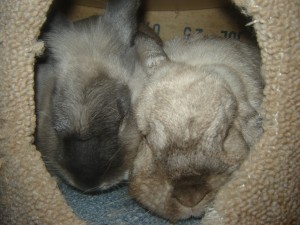I never intended to have a rabbit. It wasn’t that I was opposed to the idea; I simply never thought of it myself. No, it was my friend Heather who said, way back in 1989, “Um, my roommate’s sick and she has to go back to the States for a while; can you look after her rabbit?”–and the rest was furry, twitchy-nosed history.
The roommate’s rabbit was known as “Bun,” though his real name was Stonewall Jackson. He had a small cage, which I let him out of infrequently. When he was out, he would scrabble at my covers and nip at the small of my back to get me to move. I gave him bits of chocolate covered Oreos as treats. I did no rabbit-related research (and obviously, given the Oreos, I was bereft of common sense, too). He used to bang aluminum tart tins vigorously against the bars of his cage. The rattling of raisins in a little Sun Maid box made him insane.
He died a mere half-year after I’d inherited him. I was shocked at how devastated I was. Bunny love; bunny loss. Who knew?
Many bunnies followed him. Esther Bun, whose favourite place to flop, full-length, paws stretched out behind, was an open road atlas. Rosie, tiny yet replete with attitude. Gentle Harriet Hare of the plush fur. Giant red Russell, who lived in a downstairs recording studio and never chewed a single cord. Guinness the ridiculous lop—as cranky as he was adorable—who spent his days and nights under our kitchen table, snarfing fallen bits of dinner. Ole Frankie Blue Eyes, the pigeon-toed Dutch, who was always earnest, curious, and adoring. Adoring, in fact, of Rosie. Yes: Frank and Rosie were my first experience of the bunny bond.
Let me tell you, this is some bond.
These lagomorphs have tiny brains. They’re herbivores; they’re prey; surely (one thinks, early on in rabbit-related experience) they’re far too un-evolved to feel emotion, to be attached.
Frank and Rosie shared a food bowl. We’d fill the bowl with pellets every evening, top the pellets with greens, throw a slice of banana on either side. Frank and Rosie fell on the banana slices first. It’s hard to describe how passionately rabbits feel about banana. There is frenzy; there is fierce pursuit and blissful chewing. One night, Rosie didn’t eat her banana. In fact, she ate nothing. She backed herself into a corner and sat there until the next day, when we took her to the vet. She never came home. (Old age; lungs filling with water, failing, along with other organs.) And Frank never ate her banana slice, or her portion of the greens. It was as if someone had put up a wee, impregnable bunny Berlin Wall in the bowl. He didn’t eat her food, and he backed up into the very space she had occupied, and he hunkered down there. For three days. He didn’t eat or drink or move, and he showed no interest in the bowl when I put it right under his nose. He grieved for her. And though he did hop out and start eating again, on day four, he was never the same. I’m almost completely sure I’m not anthropomorphizing. He was never the same without her.
Right now, in our dining room, we have Bunbun and Bubsie—otherwise known as The Probe (because she’s never acted like a “normal” rabbit and is thus almost certainly an alien bit of tech, sent to gather data) and The Dark Bun (whose shadow stretches, Batman-like, on our carpet, thrown there by hall light). They too are profoundly devoted to each other. Probe is the older woman, Dark Bun the young thing who hopped into her life, it now seems, near its end. They’ve been eating together, grooming each other, humping and snuggling, for just over a year and a half. And now she’s dying.
Head-tilt. It’s a bunny thing. No one’s sure if it’s caused by a parasite or a bacterium. There are meds for this, sort of. At first they made her a little better, but now, over a month later, they’re not. She can barely keep herself upright. Her head is on a terrible angle, one eye permanently closed (and when you force it open it leaps around and around and back and forth, unable to focus).
The Dark Bun licks her closed eye, and her open one. He washes her head, and the fur near her adorable bunny butt, which she can’t reach any more. When you put her on your lap to syringe her meds into her, he puts his paws on your back, your lap, your side; he scrambles up where she is and nudges her, gently, and you, forcefully, as if to say, Be careful with her.
She’s getting worse, not better. Soon she won’t be able to sit up at all, and we’ll help her eat and clean her up—but that won’t go on for long; it can’t. She’ll die soon, this bun my sister and I flushed out from under a car by our parents’ house, nearly six years ago. We humans will grieve. Dark Bun will grieve too, and more than we will. I’m absolutely sure of this, and it makes me even sadder. I don’t understand this grief. How does his brain work? How does he love? What, precisely, will he miss? How does his memory work?
The very worst thing is the dramatic irony—looking down on them every day and knowing, though he doesn’t, that soon he’ll be alone. Or maybe he does know? Maybe that’s why he’s so very very solicitous of her right now?
Though it’s probably a futile one: my hope is that she’ll go quietly while he washes her face and eyes and understands, somehow.
Enough, because I’m getting maudlin. Point is: bunny love. It’s a thing. It’s an amazing, humbling thing.


Recent Comments